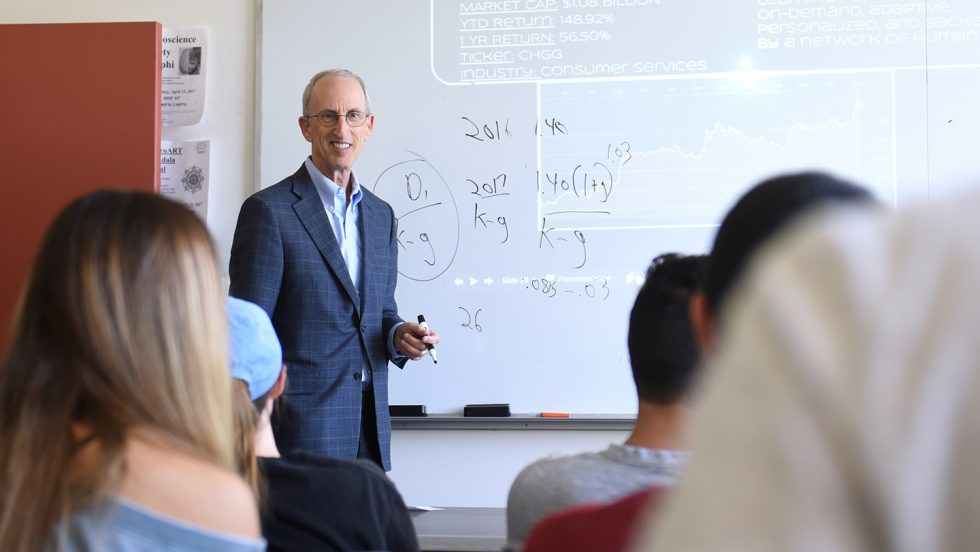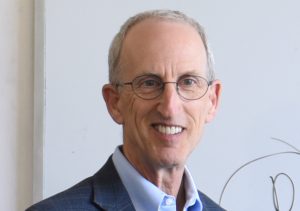
Divergent views find common ground in a proposed climate security fund.
Faculty colleagues Robert Goldberg, MBA, and Mariano Torras, PhD, didn’t always see eye to eye on the urgency of addressing climate change. In fact, they viewed the issue through completely different lenses.
“Ever since I was in graduate school, I’ve been very interested in environmental economics,” said Dr. Torras, professor and chair of the University’s Department of Finance and Economics. His earliest research in the field dates back more than two decades. “With regard to climate change, I’ve always believed that we should be doing something now about curtailing carbon emissions.”
Goldberg, a clinical associate professor in the same department, held a “more libertarian view on economic issues” than his colleague. “I was more questioning of the positions of those in favor of taking strenuous immediate action to address climate change.”
The two have been friends for years, frequently stopping each other in the hallways to discuss recent developments in public policy. After one such discussion in late 2015 about the social discount rate—a tool to compute the future value of a social program—they wondered how that idea could apply to climate change. A few months later, following several meetings and intensive research, they decided to co-author an article about a way the United States can better deal with a changing global climate.

Mariano Torras, PhD, researches well-being assessment, environmental and natural resource accounting, dematerialization trends and links between power inequality and health outcomes. His recent work has focused on climate change and financialization.
“Managing Climate Change: The Case for a Climate Security Fund” was published in the Summer 2020 Journal of Managerial Issues. Their shared conclusion—that the government should immediately create a fund for future efforts to battle climate change—would have previously come as a surprise. “I think it’s probably fair to say that we were both nudged a little bit in our thinking,” said Dr. Torras. “We definitely were further apart at the beginning than the end.”
Assuming that by the year 2100 climate change will reduce the country’s gross domestic product by about 1 percent—based on integrated assessment models used by various researchers—Goldberg and Dr. Torras estimate that the United States can counteract that figure by making annual payments of about $200 billion into a climate security fund. They argue that this amount, about 5 percent of the current federal budget, is “well within the country’s means.”
Goldberg and Dr. Torras emphasize that this number is just for comparison, however, and that the exact amount depends on climate change’s long-range effects on the economy. Some researchers estimate the damage to be more in the neighborhood of 10 percent. “The exact number, whether it’s $200 billion or $500 billion, is not what’s important,” noted Goldberg. “What’s important is to build up a reservoir of funds to be used in the future to solve the problems caused by climate change.”

Robert Goldberg is a former investment banker whose research interests include securities pricing, market segmentation and investment banking.
To raise these funds, they propose a tax that would be applied to all forms of energy, rather than just the carbon tax previously backed by Dr. Torras; a general energy tax would be less controversial and therefore more politically feasible.
The two agree that their joint research has opened up the possibility of collaborating on other projects. “It’s interesting that, despite our differences on issues, we appear to have discovered a similar way of thinking about how economic fundamentals work and with what consequences,” said Goldberg.
While working on the climate change article, they began having in-depth conversations about the U.S. balance sheet, a topic that has interested Goldberg for more than a decade. “Mariano figured out how to turn the data I had collected into a coherent article on financialization and how it has contributed to inequality, a subject I had not much considered earlier in my career,” he said. That paper has already been accepted by the Journal of Economic Issues.
Goldberg and Dr. Torras are also at work on a follow-up article that aims to explain the relationship between interest rates and the productive capacity of the country. “While Rob and I disagree on many things, we’ve been working together fruitfully on several projects,” said Dr. Torras. “I’m happy to have found a colleague who seems genuinely curious about how things work.”
“Managing Climate Change: The Case for a Climate Security Fund.” Journal of Managerial Issues, vol. XXXII, no. 2, June 2020, pp. 195-214.”